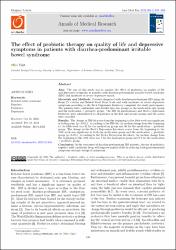| dc.contributor.author | Yiğit, Ece | |
| dc.date.accessioned | 2023-06-13T08:34:26Z | |
| dc.date.available | 2023-06-13T08:34:26Z | |
| dc.date.issued | 2023 | en_US |
| dc.identifier.citation | Yiğit, E. (2023). The effect of probiotic therapy on quality of life and depressive symptoms in patients with diarrhea-predominant irritable bowel syndrome. Annals of Medical Research, 30(4), 434-439. https://doi.org/10.5455/annalsmedres.2022.10.316 | en_US |
| dc.identifier.issn | 2636-7688 | |
| dc.identifier.uri | https://doi.org/10.5455/annalsmedres.2022.10.316 | |
| dc.identifier.uri | https://hdl.handle.net/20.500.12511/11075 | |
| dc.description.abstract | Aim: The aim of this study was to analyze the effect of probiotics on quality of life and depressive symptoms in patients with diarrhea-predominant irritable bowel syndrome (IBS) and moderate or severe depressive mood. Materials and Methods: Patients diagnosed with diarrhea-predominant IBS using the Rome IV criteria and Bristol Stool Form Scale and with moderate or severe depressive symptoms according to the Beck Depression Inventory comprised the study participants. The patients were randomized and divided into two groups as the medication only group and the medication + probiotic group. The IBS 36 questionnaire and Beck’s Depression Inventory were administered to all patients in the first and second groups and the scores were recorded. Results: The change in IBS-36 scores from the beginning to the 10th week was significant in both groups (p<0.001). According to the IBS-36, the median change from the beginning to the 10th week was 32 for the medication group and 48 for the medication + probiotic group. The change in the Beck’s Depression Inventory scores from the beginning to the 10th week was significant in both the medication group and the medication + probiotic group (p<0.001). According to the Beck’s Depression Inventory, the median change from the beginning to the 10th week was 7 for the medication group and 9.5 for the medication + probiotic group. Conclusion: In the treatment of diarrhea-predominant IBS patients, the use of probiotics together with traditional drugs will improve quality of life by reducing both gastrointestinal symptoms and psychological symptoms. | en_US |
| dc.language.iso | eng | en_US |
| dc.publisher | Inönü University Faculty of Medicine | en_US |
| dc.rights | info:eu-repo/semantics/openAccess | en_US |
| dc.rights | Attribution-NonCommercial-NoDerivatives 4.0 International | * |
| dc.rights.uri | https://creativecommons.org/licenses/by-nc-nd/4.0/ | * |
| dc.subject | Irritable Bowel Syndrome | en_US |
| dc.subject | Diarrhea | en_US |
| dc.subject | Probiotics | en_US |
| dc.subject | Depression | en_US |
| dc.title | The effect of probiotic therapy on quality of life and depressive symptoms in patients with diarrhea-predominant irritable bowel syndrome | en_US |
| dc.type | article | en_US |
| dc.relation.ispartof | Annals of Medical Research | en_US |
| dc.department | İstanbul Medipol Üniversitesi, Tıp Fakültesi, Dahili Tıp Bilimleri Bölümü, İç Hastalıkları Ana Bilim Dalı | en_US |
| dc.authorid | 0000-0002-8293-3554 | en_US |
| dc.identifier.volume | 30 | en_US |
| dc.identifier.issue | 4 | en_US |
| dc.identifier.startpage | 434 | en_US |
| dc.identifier.endpage | 439 | en_US |
| dc.relation.publicationcategory | Makale - Ulusal Hakemli Dergi - Kurum Öğretim Elemanı | en_US |
| dc.identifier.doi | 10.5455/annalsmedres.2022.10.316 | en_US |
| dc.institutionauthor | Yiğit, Ece | |
| dc.identifier.trdizinid | 1164949 | en_US |



















